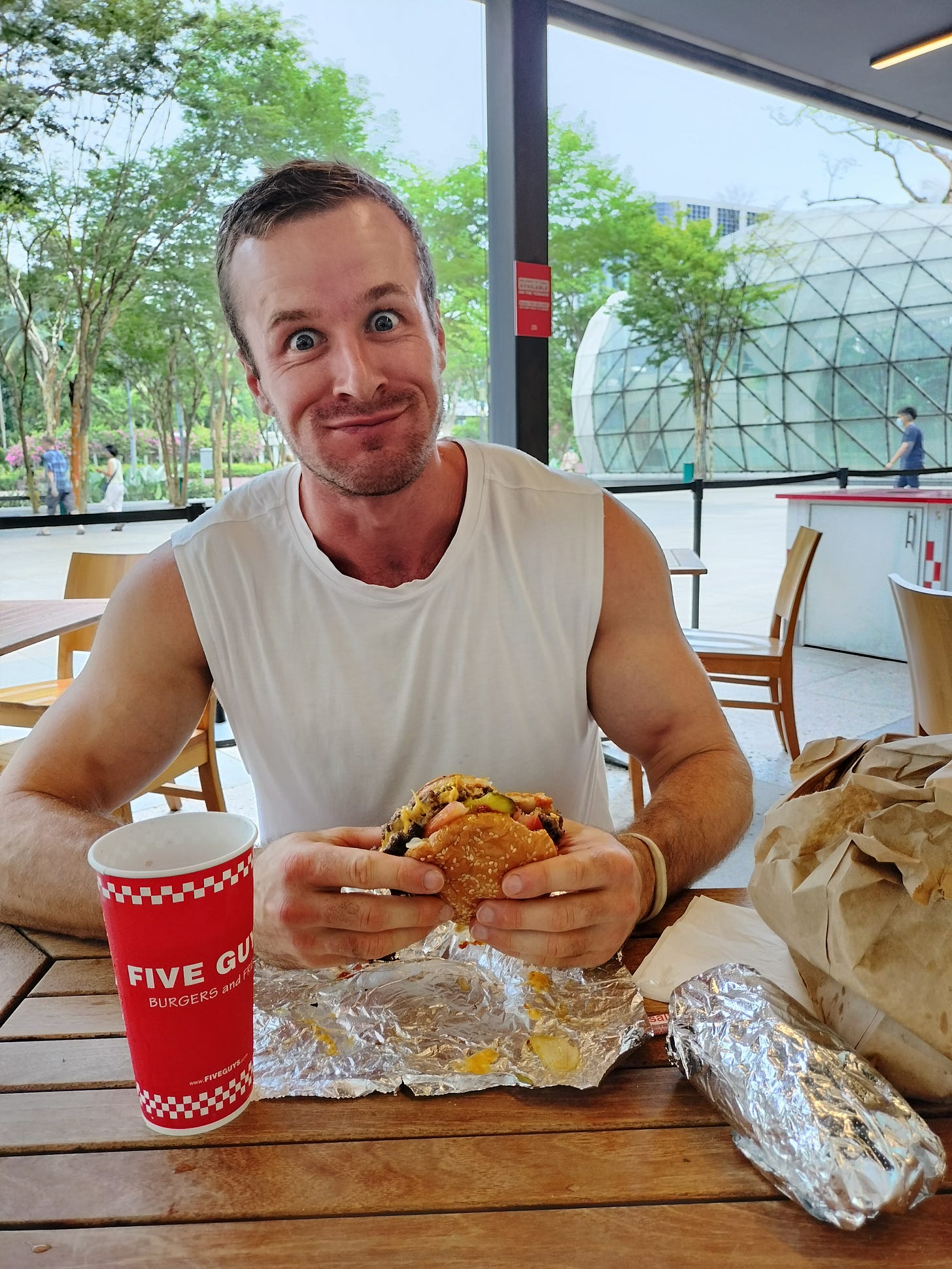We are going to be discussing mindset around food in depth in this post. If you have a history of disordered eating or an eating disorder then please proceed with caution. This is not a replacement for professional guidance or counselling.
Why is having a healthy mindset so important?
Reason #1 - time spent on food each day
Time spent on food can really add up:
thinking about what to eat
writing shopping lists and going to the supermarket
cooking
eating (duh)
thinking about what was just eaten or what we will eat
Given how much time we invest in food, we want our mindset around food to be positive and not toxic. Otherwise we are spending large chunks of time in negative thought patterns which can leave us feeling mentally exhausted.
If every time we eat we evaluate how ‘good’ or ‘bad’ that decision was, then that’s a lot of mental gymnastics. And you’ll always beat yourself up more for the ‘bad’ choices than praise yourself for the ‘good’ ones.
Reason #2 - cultural and social importance of food
Culturally and socially food is a very important part of our daily lives:
Cultural traditions
Family traditions
Social time with friends
Sense of identity as 'foodie' or career
Enjoyment
If we don’t have a healthy mindset around food, this important part of our lives can be tainted with stress and worry rather than simply enjoyment or connection. The taste, smell and ceremony that can come with food is something we want to be savouring, not ruining it with stressful thoughts.
Reason #3 - determinant of long term success
Lastly, having a healthy mindset is THE biggest determinant of long term success:
In general, food matters more than exercise
Health goals made from a negative space are less effective
Your relationship with food is a big part of whether you enjoy or resent the process and therefore whether it will last
Every choice around food is psychologically motivated
Research consistently demonstrates that a flexible mentality is superior to a rigid one
This means that cultivating a healthy food mindset will directly correlate to your success. If you are serious about succeeding with your health goals, then this should be reason enough to have a deeper look at your food related thoughts.
So what foods are good and what foods are bad?
What you think is ‘good’ food:
Vegetables
Brown grains
Low fat
Natural
Organic
Sugar free
Dark chocolate
Bliss balls
Butter in coffee (lol)
What you think is ‘bad’ food:
Fruit
Sugar
Carbs
White grains
High fat
Potatoes
Artificial sweeteners
Ice cream
McDonalds
The above almost all stem from a fat loss/gain perspective, and are largely based upon calorie density and degree of processing.
What is actually ‘good’?
Foods that align with your goals, and that you enjoy.
With this in mind - there ARE no universally good foods. The foods that are actually 'good' for you are the foods that help you achieve your goals *mike drop*. So the answer to any question of "is this good for me?" is "it depends on what your goals are".
What is 'good' for you is going to be very different to what is 'good' for someone else.
Goal generalisations
There are some generalisations that we can apply, but these are all related directly back to what your goal is. Here are some common goals.
Fat loss goal
In general, foods that are lower in calories but higher in volume are helpful. This is where most people’s assumptions about food stem from, as there are generally more people who want to lose fat compared to people wanting to gain muscle and therefore far more fat loss oriented content online.
Vegetables, fruits, wholegrains, lean proteins and even things like sugar free soft drinks are all great examples here.
Muscle gain goal
In general, foods that are higher in calories and lower in volume are helpful.
Some examples include more simple carbohydrates, higher fat cuts of protein, liquid calories and foods high in unsaturated fat (like peanut butter and olive oil).
But these are still GENERALISATIONS and you still need to only focus on what works for YOU.
e.g. for James lots of vegetables are unhelpful for muscle gain but helpful for fat loss, for Kate coffee is unhelpful for muscle gain but helpful for fat loss.
More types of goals
There are many different kinds of goals. Fat loss and muscle gain are just two of the more common goals that people may have. There are other goals that change the context of what foods are and aren't appropriate choices, such as:
Someone wanting to work on their relationship with food
For them it might be a burger, as they are trying to be okay with eating a food that they previously might not have been able to eat without guilt or compensatory behaviours.
Someone trying to get to the bottom of digestive issues
For them it might be reducing intake of certain vegetables or carbohydrate sources to figure out what is aggravating their digestion.
Someone trying to grow confidence with new foods
For them it might be cooking a new meal to help them gain confidence with their skills, even if some of those ingredients might not be ‘healthy’.
Someone wanting to role model for their kids
For them this might be ice cream, so they can practice having ice cream with the family without making any negative food related comments that their children will hear.
All of these are examples of individualised context that changes what foods may be deemed 'good' choices. Taking into account differing goals, preferences, cultures, and mentalities means everyone is going to be different.
Energy balance - an important concept to understand
Energy balance is simply the balance between how much energy you take in through food vs how much energy you expend.
Energy in
All food is made up of four macronutrients:
1 gram of protein = 4 calories (4 units of energy)
1 gram of carbohydrates = 4 calories (4 units of energy)
1 gram of fat = 9 calories (9 units of energy)
1 gram of alcohol = 7 calories (7 units of energy)
Energy out
There are four ways that our bodies burn energy throughout each day:
Deliberate exercise 5%
Digestion (TEF) 10%
Non-deliberate movement (NEAT) 15%
Base metabolism (BMR) 70%
A reminder: food doesn't have a moral agenda. Food is just nutrients.
"Hello I am 150 grams of tofu. I am made up of 25.5 grams of protein, 1 gram of carbohydrate and 12 grams of fat. I have no agenda and I don't care about you, or what you think of me".
How to mend your mindset
Step 1 - goal clarity
Be extremely clear on your goal
The answer to "is this food 'good'?" is "it depends on what your goals are". So if you don't already know what your health related goal is, take this time to have a think about it.
It doesn't have to be extremely specific, but it should at least give you an idea of what should predominantly inform your food choices.
When you have clarity on your goal, your food choices can be driven by logic rather than morality.
Step 2 - audit environment
Do an audit of your environment
Have you set yourself up so that you are encouraged to think about your food as 'good' or 'bad'?
Is your pantry or fridge so controlled that you have zero 'bad' foods in your house? Are you using your environment to mask the ultimate issue of how you think about food?
Find the balance between extreme control (zero 'less of' foods available') and no control at all (too many 'less of' food easily available at all times).
Step 3 - catch yourself
Notice when you use the terms 'good' or 'bad' (or anything similar)
Listen to your own thoughts and see if you can hear yourself thinking the words 'good' or 'bad' when it comes to food.
Catch your own brain in the middle of the thought and call yourself out on it.
Also catch yourself if you verbalise 'good' or 'bad'. Some very common phrases that are considered 'normal':
"I'm being bad today"
"I've been good all week"
“This is naughty”
“I’m cheating”
Step 4 - embrace discomfort
Lean into any discomfort you feel
Once you have caught yourself food labeling, try to lean into that discomfort and eat that 'bad' food.
Eat those chips and actually enjoy them.
Overall be very deliberate and mindful about what you are eating rather than just mindlessly grabbing a snack or rushing through a meal.
Eating driven by guilt almost always leads to eating far more than intended, to the point where it’s not even enjoyable. This directly stems from the idea that you’ve already “screwed up” by having that food at all.
Step 5 - change the label
Use 'more of' foods and 'less of' foods
Now that we have caught ourselves using 'good' or 'bad' labels then leant into the discomfort of our 'bad' foods, we want to change the dialogue for next time this happens.
Instead of using 'good' or 'bad', let's change these labels to a general 'more of' and 'less of' foods.
There are no longer any off limits foods! 'Less of' foods are ones that you still gain enjoyment, satisfaction, comfort etc. from but that don't move you toward your goals. Note that we aren't having NONE of these foods, just less of them.
Summary
What your goals and priorities are will dictate which foods you want to have more of, and less of.
Food is an unavoidable part of your life, so don’t cause yourself additional stress and unhappiness by applying morality and emotion to it.
There are far more goals than just “eat as few calories as possible”, and you’re not always going to eat a food based on its nutritional value.
Stop looking for other people to tell you what foods you should have, and instead base it upon your own goals.
If you have a good/bad, guilt driven mentality around food then this is your number one priority to work on. You will not get any lasting results until you do.
If you would like to start working on your food mindset then we can help! This is a huge part of the work we do with clients. Get in touch by replying to this email, or check out how you can work with us on our website here.
Kate and James x






This is very helpful, thank you!